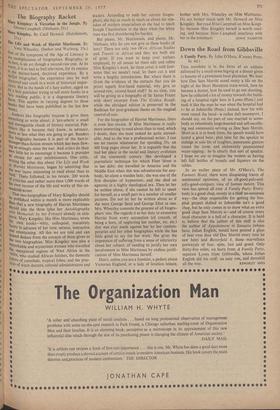The Biography Racket
MarY Kingsley: A Victorian in the Jungle. By Olwen Campbell. (Methuen, 21s.) The Life and Work of Harriet Martineau. By
Vera Wheatley. (Seeker and Warburg, 35s.) C/,,NE of the symptoms of the Age of Literacy is ;fle multiplication of biographies. Biography, at IS best, is an art though a second-rate one. At its ‘■• 'orst, it is as bad as bad television, for its essence Is the second-hand, doctored experience. By a skilful biographer, the experience may be well doctored and result in a work of historical impor- tance. But in the hands of a lazy author, egged on by a lazy publisher trying to sell more books to a for
reading public, it is a degenerate literary 5orm, This applies in varying degrees to three books that have been published in the last few weeks.
Authors like biography because it gives them something to write about; it 'pre-selects' a small and manageable chunk of literary material. Pub- lishers like it because they know, in advance, like ore or less what they are going to get. Readers like biography because it is part of the fact-is- stranger-than-fiction stream which has been flow- iag so strongly since the war. And critics do their °Wu little bit to encourage it because it provides an excuse for easy exhibitionism. One critic, Writing the other day about The Life and Work 15:1- Harriet Martineau, began by admitting that she was 'more interesting to read about than to read.' There followed, in his review, 200 words of criticism and rather more than 1,000 words of his Own version of the life and works of this un- readable writer. , That two biographies of Mary Kingsley should 2,e Published within a month is more explicable than that a new biography of Harriet Martineau should join the three (plus her Autobiography wit/: Memorials by her Friends) already in exis- tence. Mary Kingsley, like Miss Martineau, wrote her own books—witty, colloquial, macabrely f"nnY in advance of her time, serious, instructive
and entertaining. All this we are told and can Indeed deduce from the extracts of them given in
e • two biographies. Miss Kingsley was also a the unexplored and mysterious woman who travelled '11'e unexplored regions of West Africa in the i;,892S, who studied African fetishes, the domestic 1;""lts of cannibals, tropical fishes, and the prac- tices of witch doctors, colonial administrators and
traders. According to both her current biogra- phers, she has as much to teach us about the mis- takes of modern imperialism as she had to teach Joseph Chamberlain in the days when the white man was first shouldering his burden.
But please, Mr. HutchinsOn, and please, Mr. Methuen, why do you not give us these books of hers? There are only two (West African Studies and Travels in Africa) and they are both out of print. If you want to keep your authors employed, by all means let them edit and refine Miss Kingsley's work, let them cover it with foot- notes that we needn't read, let them cut it and write a lengthy introduction. But where there is (from the evidence of the extracts that you do print) superb first-hand material, why give us second-rate, second-hand stuff? In no time, you will be giving us a biography of Sir James Frazer with short excerpts from The Golden Bough, while the abridged edition is preserved in the Bodleian for post-graduate theses on the magical control of rain.
For the biographer of Harriet Martineau, there is even less excuse. If Miss Martineau is really more interesting to read about than to read, which I doubt, then she must indeed be quite unread- able. And as she was a professional writer, I can see no reason whatsoever for spending 35s. on 400 long pages about her. It is arguable that she had her place in the social and literary evolution of the ninetcenth century. She developed a journalistic technique for which Fleet Street is in her debt; she travelled in America and the Middle East when this was adventurous for any- body, let alone a maiden lady; she was one of the first disciples of hypnotism;. and she died an agnostic in a highly theological era. Then let her be written about, if she cannot be left to speak for herself, as a small part in a number of smaller pictures. Do not let her be written about as if she were George Sand and George Eliot in one. Mrs. Wheatley commits the greatest of all biogra- phers' sins. She regards it as her duty to exonerate Harriet from every accusation (of conceit, of being a bore, of neglecting her mother, etc. etc.) that was ever made against her by her contem- poraries and her other biographies while she has little good to say for her work. She gives the impression of suffering from a sense of inferiority about her subject, of needing to justify her own involvement in Miss Martineau by endless justifi- cations of Miss Martineau herself.
Don't, unless you are a feminist, a pedant about Victorian England, or a lady of limitless leisure, bother with Mrs. Wheatley on Miss Martineau. Do not bother much with Mr. Howard on Miss Kingsley. But read Miss Campbell on Miss Kings- ley because Miss Kingsley herself is worth read- ing, and because Miss Campbell interferes with






























 Previous page
Previous page